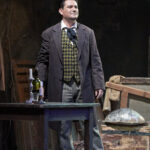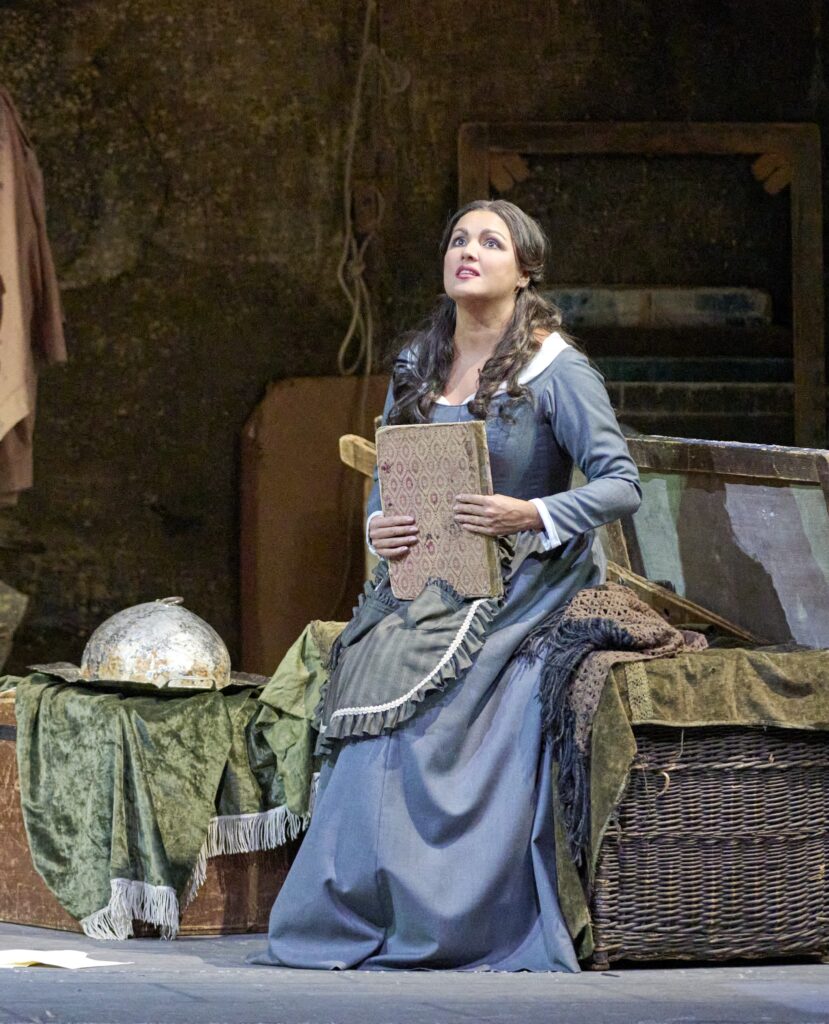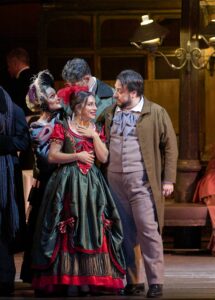The wall coverings of this ‘pad’ are suitably aged, distressed, ‘grotty’. Puccini – an exponent of verismo– being a stickler for detail. As does his score -1896- bristle with high-spirits, and detailed orchestral descriptions, Vienna State Opera Orchestra immaculate under Bertrand de Billy. And Giacosa/Illica’s libretto has natural,streetwise dialogue.
Vienna State Opera’s vintage (Franco Zefirelli) production actually premiered in 1963 – legendary, atmospheric, ‘authentic’ realistic scenery. That makes it 60 years old, and some would argue a museum piece.
 They’re out on the town drinking. Rodolfo has ‘one more editorial to write’; not interested in a woman, will join them later. (‘Be careful on the stairs, it’s dark’, (as Colline falls over.)
They’re out on the town drinking. Rodolfo has ‘one more editorial to write’; not interested in a woman, will join them later. (‘Be careful on the stairs, it’s dark’, (as Colline falls over.)There’s a knock. ‘Her candle’s gone out, and she’s coughing violently; invited in and she collapses. Rodolfo helps her up. He holds her hand: how cold your hand is. Luckily the moon is shining. Rodolfo tell her about himself: who am I? A poet. And how do I live, I live. (In dreams, he’s a millionaire.) Occasionally, all his riches are stolen by two beautiful eyes…Saimir Pirgu’s tenor is powerful, with impressive technique. But although he’s a ‘young man’, Saimir’s Rodolfo is superficial; this is a circle of intellectuals, and we know Rodolfo is a poet, writer.
Now you know me, tell me who you are? Anna Netrebko (Mimi), dowdy, wearing layers, shawl over a charcoal skirt; her hair plaited; and, quaintly, she’s wearing a bonnet. Mi chiamino Mimi, ‘People call me Mimi’; but her name is Lucia. She embroiders silk, or linen. A quiet life. But, she points up to the skylight, her voice rising in ecstasy, she likes to see the sun. When winter’s over, the sun’s rays feel like the kiss of spring. Netrebko’s Mimi has an innocence, grace, lack of affectation. ‘That’s all there is to her’. Silly imposing on him, she, only a neighbour.
But (Pirgu’s) Rodolfo sings, ‘Oh, lovely girl (O soave fanciulla), love alone commands me, through the kiss of love’…At first she demures, No please! She dares not! But he suggests being together, the cold outside…She’s standing , matronly gown, with prim white collar. (Really Netrebko’s outfit is like a disguise, opera is all about theatre.) They draw together. Tell me you love me.
Act 2, at Café Momus, and Zeffirelli’s staging on two levels is still a wonder. Market stalls front of stage; behind a panorama of a long Paris boulevard. Stalls are cleared to reveal an iconic Paris cafe- hanging lamp, oak panels, the works.
Rodolfo and Mimi are centre stage, Rodolfo bought Mimi the bonnet she always wanted. The most elusive poetry is that which teaches us love, he sings.
Musetta ( brilliant soprano Nina Minasyan) is the centre of attention. She’s out to make Marcello -they’re always fighting in a turbulent relationship- jealous. They’re a foil to the apparently placid lovers Rodolfo/Mimi.
Minasyan’s Musetta is exotic- red hair, splendid necklace, her long red gown embossed in black. She’s with the rich, older man Alcindor, (Marcus Pelz). Rodolfo notes, ‘she speaks to this man, but signals to the other.’ In her famous aria, Quando m’en vo, when I stroll, the people turn and look at me: all admire my beauty. And when they avoid me… she sings, ominously, You hide your pain, but it will torture you to death.
Musetta creates a tantrum, a pain in her feet, to escape her sugar-daddy, and be back with Marcello. (The bill so soon!) A group of soldiers, a military band performing overhead, -yes,really, on stage!- plays as a distraction. ‘The gentleman’, her stooge, will pay..
Ironically, Minasyan’s fiery Musetta is the role we imagine for Netrebko. Whereas Netrebko’s Mimi’s get-up looks like a disguise. So obviously drab;even the bonnet, a conceit. Netrebko seems held back, her voice staying in a lower register.
Act 3’s snow-filled stage, as if seen through a misty lens, is like a French Impressionist painting. Mimi asks for the tavern with ‘the artist’. Netrebko, still in the same clothes and without gloves. She confides in Marcello, Rodolfo ‘no longer loves her’; he’s consumed with jealousy. ‘One step, one word and he becomes suspicious’. Netrebko, moving, forlorn, he’d sung, find yourself another lover.
In their duet, Marcello and Rodolfo muse on their respective lovers. In Marcello’s aria, thought his heart was dead. She brought it back to life. ‘Only fools engage in true love, love without laughter is tedious.’ By contrast, Rodolfo, obsessively jealous, calls Mimi a slut. But he’s in pain. He loves her more than anything, but everyday wracked by terrible fear. The room is damp , Mimi-O-mia vita, porra Mimi.
Mimi in hiding, Netrebko’s now revealed by her terrible cough. Mimi adio, she’ll go back to her lonely nest, to her embroidered flowers. Netrebko, voice raised, sings tenderly of the pink bonnet. But, reunited in their powerful duet, Netrebko and Pirgu centre-stage, sing to irresistibly surging orchestral accompaniment, being alone in winter is intolerable.
Petean’s Marcello and Musetta (Minasyan), far-stage, are as usual bickering. (You’re behaving like a husband.) Rodolfo and Marcello bid farewell. Netrebko/Mimi exclaims to Rodolfo, I am yours forever. They’ll part when spring comes. She,’If only winter would never end.’
Act 4 begins as it started in Act 1’s Bohemian attic, but Puccini’s bouncy intro is ironic, the optimism soured. Rodolfo sings of his despicable pen, Marcello wants to paint landscapes, but ‘keeps drawing dark eyes’. They discuss their lovers; pretend indifference, but sing of their true feelings. The four play charades; the mood changes. Mimi is outside and desperately ill. (They collect for a doctor; Colline sells his trusty coat; Rodolfo comforts her, but she won’t recover.)
Netrebko, in pale green, her bed centre-stage in the artist’s studio, is powerfully convincing in the final scene. She shines, availing herself of her considerable experience, vocally and dramatically. Netrebko and Pirgu sing of their first meeting. How she cunningly loses her key to ensnare him.
In the deathbed scene, Netrebko, ever the consummate actress, is exceptional: the highlight of her performance, her powerhouse soprano modulated, conveying the tragedy: the inevitable fate of (19th century) consumption. More poignant when she’s at last found love.
Yes, Netrebko gives the drama, however familiar, everything she’s got. Even looks uncannily young, facially. So it feels fresh, not hackneyed. We experience La Bohème anew; but that’s Puccini’s skill, a star supporting cast and Vienna’s sympathetic musical forces. © PR 18.09.2022
Photos: Anna Netrebko (Mimi); Saimir Pirgu (Rodolfo); Nina Minasyan (Musetta), George Petean (Marcello) © Michael Pöhn/ Wiener Staatsoper


